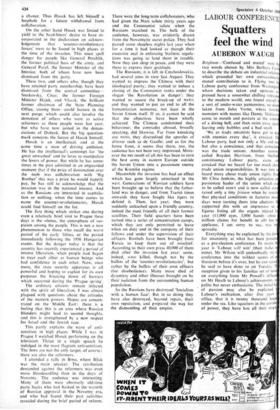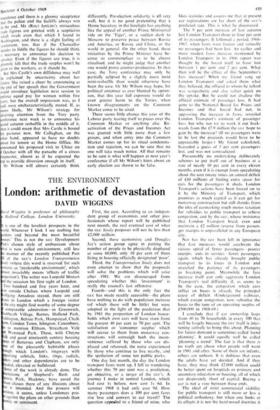LABOUR CONFERENCE
Squatters feel the wind
AUBERON WAUGH
Brighton—`Confused and muted' were th two words chosen by Mrs Barbara Castle to describe the debate on industrial relatior which preceded her own extraordinaril muted contribution to it. Flying into tt Labour party conference from Washington where decisions taken and opinions ex pressed have a somewhat chilling relevanu to the modern world, one found oneself a sort of under-water pantomime, no doub taken from Jules Verne, where horrib' monsters with names like Danny McGarve come to mouth and posture at the windo of a diving bell, and then swim away again leaving only bubbles and a bad smell.
'We as trade unionists have got to du with enemies every day', it croaked. Th. Labour party had not only a life and so but also a conscience, and that conscieno was the trade unions. Another monste called Royden Harrison, from Sheffiel constituency Labour party, came ari croaked that we heard far too much abou trade union responsibilities. It was time v,1 heard more about trade union rights. Evel Mr Clive Jenkins, the highly articulate ai passionate leader of the union which usi to be called ASSET and is now called AST4 raised only a tiny fritson when he reveals that physical conditions in factories novo days were turning them into abattoirs. H supported this with an impressive set figures listing all the organs injured l year (11,000 eyes, 3,000 hands—about million claims for benefit in all) but applause, I am sorry to say, was o sporadic.
Everything may be explained by the desi for unanimity at what has been present as a pre-election conference. Its motto t year is 'Labour will win' (their italics mine). Mr Wilson will undoubtedly stir conference into the wildest scenes of thusiasm before it's over, but he can scare be said to have done so on Tuesday. reception given to his familiar set of not on everything from Mr Powell's influe on Mr Heath to Labour's achievements. polite but never enthusiastic. The initial I of passion may also be explained Labour's realisation, after five years office, that it is twenty thousand leag under the sea. Like squatters in the corrid of power, they have lost all their ()rip truculence and there is a gloomy acceptance that the police and the bailiffs always win in the end. Mr (Roy) Jenkins's miraculous trade figures are greeted with a scepticism which rivals even that which I found in Washington, and there is a slight feeling of resentment, too, that if the Chancellor decides to fiddle the figures he should think it necessary to announce his decision in advance. Even if the figures are true, it is gloomily felt that the trade surplus won't be given to the workers, as it should be.
But Mrs Castle's own diffidence may well be explained by uncertainty about her future. She raised a cheer by announcing at the end of her speech that the Government would introduce legislation next session to enforce equal pay for women within five years, but the overall impression was, as I id. most uncharacteristically muted. If, as
ms likely, Mr Wilson's strategy for diverting attention from the Tory party inference next week is to announce his grand autumn reshuffle in the middle of it, then it could mean that Mrs Castle is bound or pastures new. Mr Callaghan, on the ether hand, appeared to have no doubts bout his tenure at the Home Office. He nnounced his proposed visit to Ulster on October with all the panache of a circus 'ngmaster, almost as if he expected the rip to provide diversion enough in itself.
Mr Wilson will almost certainly think differently. Pre-election solidarity is all very well, but it is no good pretending that a Home Secretary in the limelight has anything like the appeal of another Prime Ministerial ride on the 'Tiger', or a sudden dash to Moscow to preserve peace between Russia and America, or Russia and China, or the world in general. On the other hand, these initiatives by the Prime Minister have be- come so commonplace as to be almost ritualised, and he might judge that another one would prove counter-productive. In that case, the Tory conference may only be partially eclipsed by a slightly more lurid mini-reshuffle than would otherwise have been the case. Or Mr Wilson may hope, his political antennae as ever blunted by optim- ism, that this year full exposure would do even greater harm to the Tories, when known disagreements on the Common Market come to be aired.
There seems little chance this year of the Labour party tearing itself to pieces over the Common Market or anything else. Re- activation of the Prices and Incomes Act was greeted with little more than a few groans, and when entry into the Common Market comes up for its ritual condemna- tion and rejection, we can be sure that no one will take much notice. All that remains to be seen is what will happen at next year's conference if all Mr Wilson's hints about an early election are shown to be false.



































 Previous page
Previous page